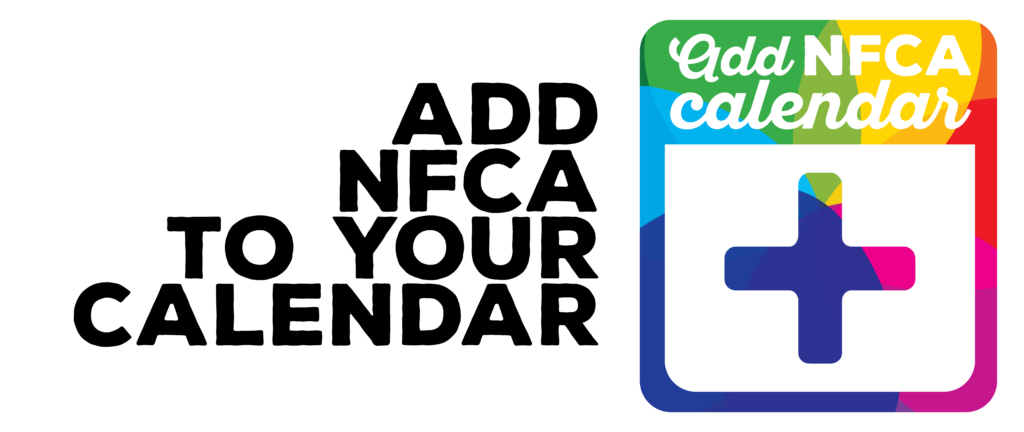
Was this newsletter forwarded to you? Subscribe here to keep up to date on NFCA News!
In this edition:
Gifts to Grow the Co-op Economy
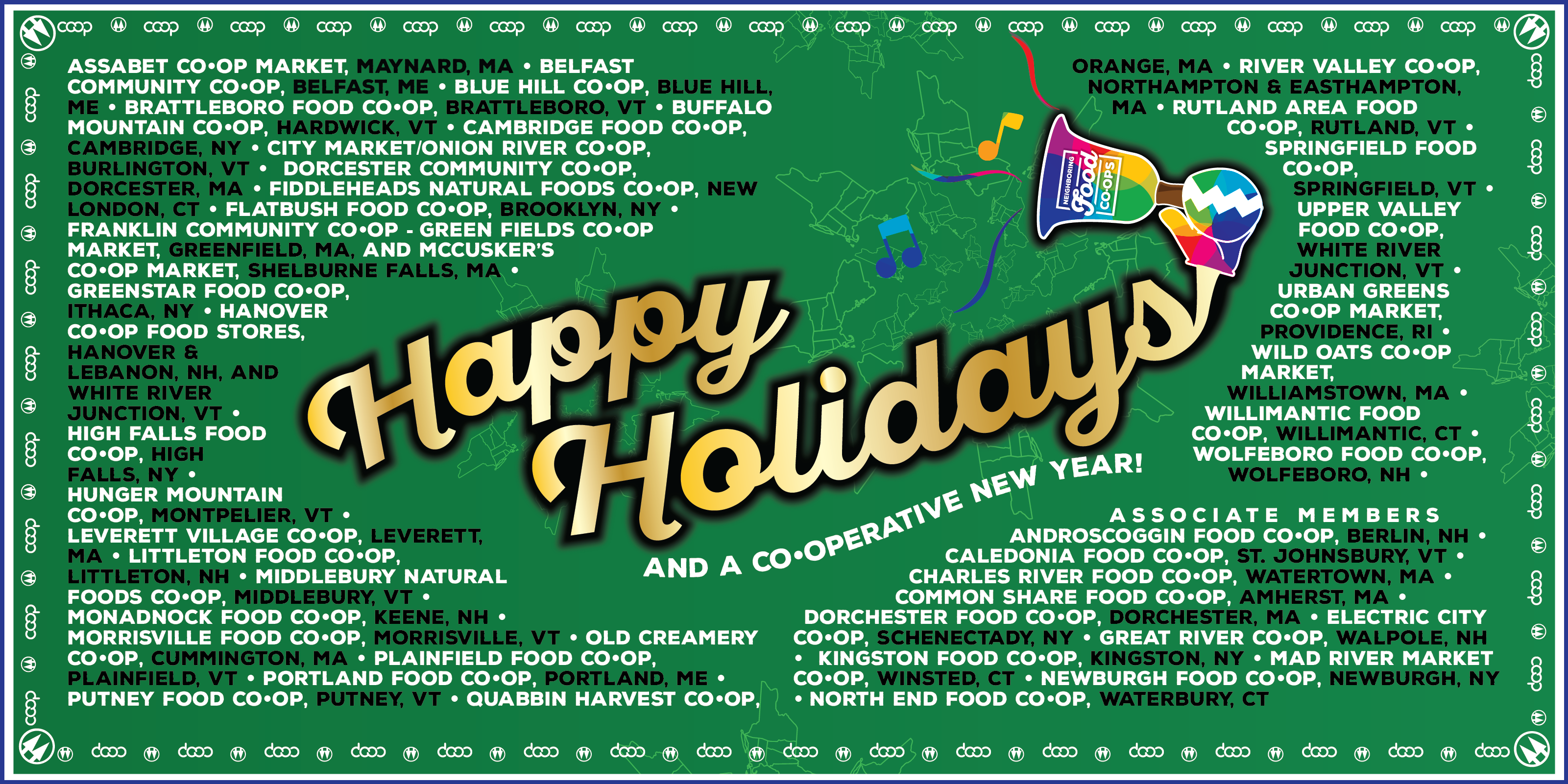
As we gather to celebrate the holiday season, give the gift of co-operation!
Co-op Gifts to Share the Bounty. Your local food co-ops offer many products that not only make great gifts but also help build a more healthy, just, and sustainable food system and a more inclusive local economy:
- Make your own Gift Basket filled with Locally Made Items or Personalized Themes for everyone on your list! Check out these suggestions from Littleton Food Co-op, and awesome offerings at Upper Valley Food Co-op and Fiddleheads Food Co-op, or peruse the offerings at your local food co-op!
- Special Holiday Foods & Beverages and all of the ingredients you need for your celebrations, like artisan and regional special cheeses for creating the perfect cheese platter or cheese ball, or pairing with La Riojana Co-op Wines available exclusively at your local food co-ops.
- Food as Gifts! Learn to make special foods to give as gifts or for shared meals. Check out your co-op’s cooking classes,like Co-op Food Stores offerings or try something new like City Market’s cooking and baking sessions.
- Share the Co-op Love! Can’t decide what to get your loved ones? Our co-ops like Portland Food Co-op have gift cards for everyone on your list. Or give the gift of co-operation with a membership in your local food co-op or a start-up co-op like Androscoggin Food Co-op, NH. Great for mailing, too!
- Share Experiences this season like Littleton Food Co-op or Brattleboro Food Co-op’s sessions on Gingerbread House Making.
- Purchasing a Tree? Check out how our food co-ops are partnering with local tree farms like River Valley Co-op’s sustainable tree sale, and Brattleboro Food Co-op’s donation to Groundworks Collaborative for every tree sold. Many co-ops, like Belfast Community Co-op, are offering local and organic trees.
Give the Gift of Co-operative Education! As you consider your year-end giving, check out the many opportunities that our co-operative community has created to help leaders of all ages access the training and information they need to be effective members, directors, and staff, including:
- The Cooperative Education Fund, which offers grants for the training and education of food co-op staff, managers, and board members. You can make a special charitable donation in honor of recipients of the NFCA’s “Neighboring Co-operators,” including honorees such as Cornelius Blanding, Executive Director of the Federation of Southern Cooperatives / Land Assistance Fund, and Glenn Lower, former General Manager at Middlebury Natural Foods Co-op.
- The Co-operative Management Education program at Saint Mary’s University offers an online Master of Management program and in-person opportunities for co-operative professionals. You can support student scholarships by giving online.
- The FCI Cooperative Futures Fund supports the development of new food co-ops. You can make a donation in honor of a loved one, contributing to the growth of the co-operative movement.
However you choose to celebrate this season, at the co-op you can find all of the ingredients you need for to bring joy to friends and family, whether near or far — while building a more inclusive and sustainable community!
To find a food co-op near you and more co-op resources, please visit: https://nfca.coop/members
Co-operative Pioneers!
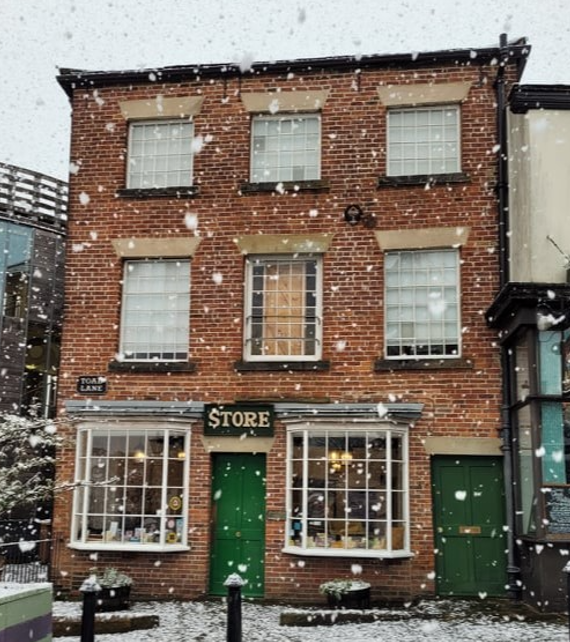
The Rochdale Pioneers Museum is now housed in the building where the Rochdale Equitable Pioneers Society opened their first co-operative grocery store on Toad Lane, Rochdale, Greater Manchester, England.
On December 21, 1844, the lighting of a candle marked the opening of a small community grocery store that influenced the world in surprising ways.
The offerings on the shelves including basic items such as butter, sugar, flour, and oatmeal. While seemingly modest, these products were significant at the time because they were difficult for working people to obtain and were often impure when purchased from other stores. From its beginnings, the co-operative movement had food security and economic inclusion at its heart, empowering communities to work together to meet their shared needs and aspirations.
Building on the many experiments in economic democracy that had come before them, the Rochdale Society of Equitable Pioneers had spent the previous year saving their capital, drafting a set of co-operative business practices, and planning for the future. They rented a small shop on Toad Lane in Rochdale in the North of England which, despite much opposition, prospered. Their goal, however, was not just to establish a single grocery store for their community. Rather, it was only the first step in a plan to leverage the purchasing power of working people to create a co-operative economy. This vision included production, housing, farming, and education, among other endeavors.
The practices put in place by the Pioneers were later adopted by the International Co-operative Alliance (ICA) and translated into a set of principles that came to serve as a model for global movement for economic democracy that today includes more than a billion people around the world. Early advocates of the “Rochdale Model” in the United States of America included the Grange (founded 1867), the National Farmers Union (1902), the Cooperative League of the USA (1916, now NCBA CLUSA),the Negro Cooperative Guild (1918), and the American Farm Bureau (1919). In 1995, the ICA approved an updated Statement on the Co-operative Identity, which supplemented the Principles with a Definition and a set of Values including equality, equity, and solidarity.
Economic education has been a basic priority of the Co-operative Movement since its beginnings. Today, it is recognized in Principle 5, “Education, Training & Information,” which recognizes that the ability of co-ops to empower people depends on engaging “the general public — particularly young people and opinion leaders — about the nature and benefits of co-operation.”
As part of our commitment to education, the Neighboring Food Co-op Association (NFCA), in collaboration with the National Farmers Union and the Cooperative Development Foundation (CDF), has produced a video series to help our food co-op engage their members, employees, board members and community members about the co-operative movement. You can learn more about the contribution of the Rochdale Pioneers and why they are still relevant today in the webinar, “Rochdale & The Early Co-operative Movement.”
Erbin Crowell is Executive Director of the Neighboring Food Co-op Association. To view this video and other resources for education and engagement, please visit our Co-operative Education Webinar Series.
Co-ops in the News

Bringing Trauma-Informed Yoga to Under-Resourced & Disenfranchised Communities
The Co-op Spirit
A Taste of Home: Afghan Woman Bakes Bread to Sell at Local Co-ops
Brattleboro Reformer
Charles River Food Co-op Marks Firsts, Looking for Locations for Store
Watertown News
Has your co-op been in the news recently? Send your item to info@nfca.coop.
New GM at Urban Greens!
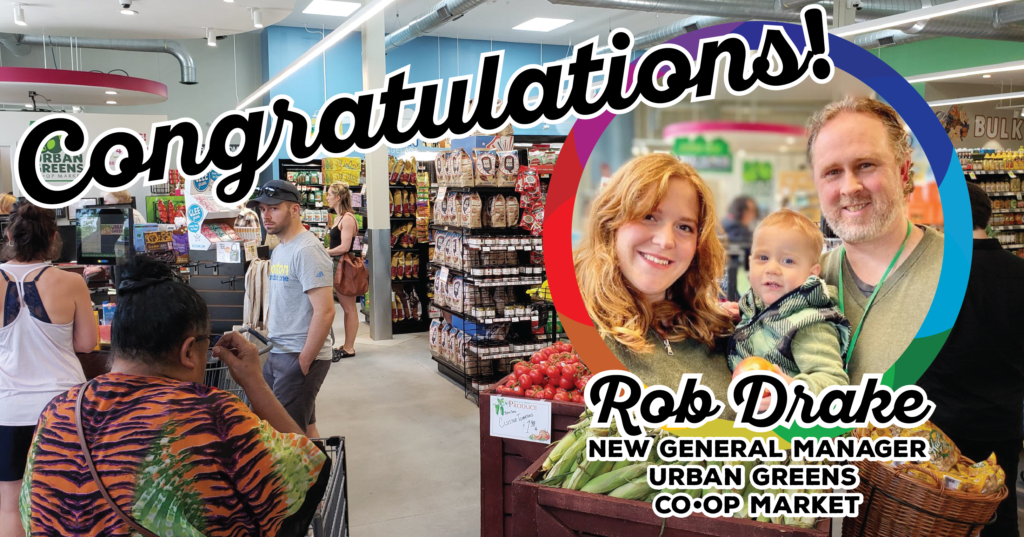
The Neighboring Food Co-op Association extends a warm welcome to Rob Drake, the new General Manager for Urban Greens Co-op Market in Providence, Rhode Island.
Rob isn’t new to food co-ops, bringing 11 years of experience working at Hungry Hollow Co-op in NY and at Briar Patch Food Co-op in Grass Valley, CA.
Rob, his wife Frances, and their 1-year-old son Robbie, are looking forward to being a part of the Urban Greens Co-op community as they relocate to Providence.
In recent e-mail to Urban Green’s members, Rob wrote, “Urban Greens is a co-op with a short challenging history, opening right before a global pandemic hit, and the following economic fallout and changes to everyday life that we’ve dealt with since. I’d say the fact that this co-op community has been able to successfully navigate these past four years, with doors open and a growing, enthusiastic customer base is a testament to our strength, and potential for growth and success.”
“I wanted to come here to Urban Greens because of this potential,” continued Rob, “To be a part of helping us to put the pieces together that will take us to the next level as a co-op. The pieces are all here, from our already-mentioned customers to a phenomenally dedicated and caring staff who I see go above and beyond every day. I’m grateful to our Board of Directors for trusting me with this challenge, and for the work we have begun together.”
Please join us in welcoming Rob Drake to the Neighboring Food Co-ops community and look forward to meeting him at our Annual Meeting in March. For more information on Urban Greens Co-op Market, visit their website.
December Cave-to-Co-op Special
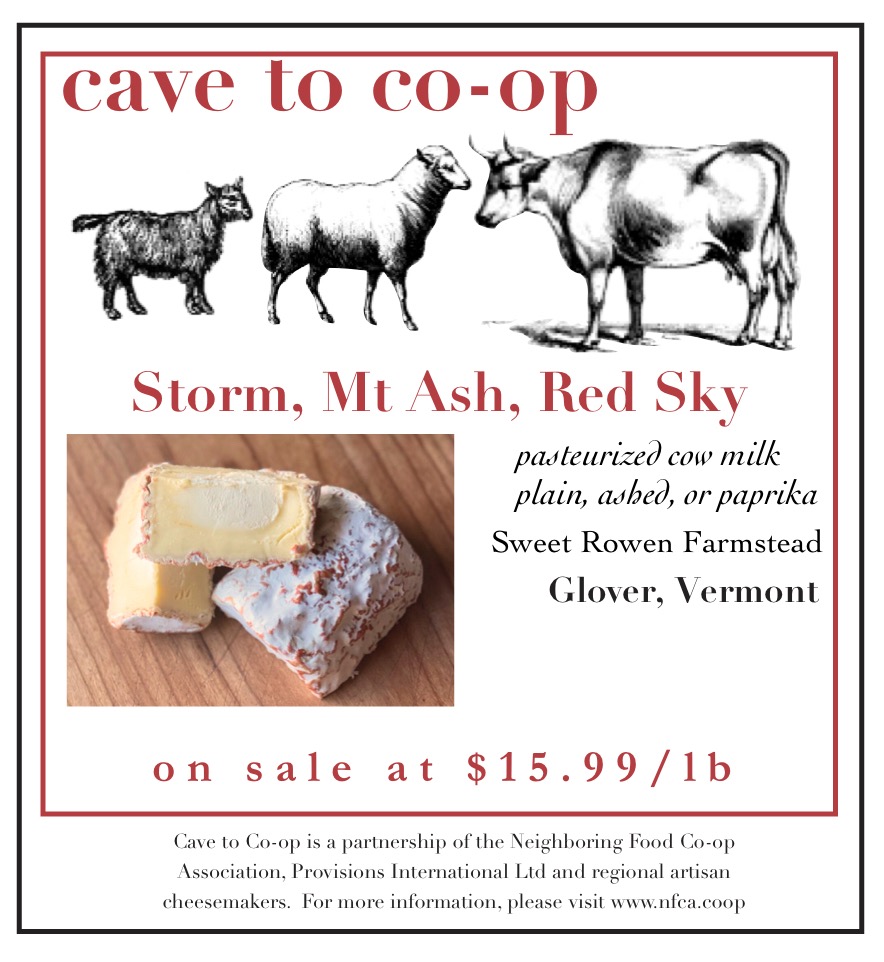
This month’s special cheese is a trio, Storm, Mountain Ash, & Red Sky from Sweet Rowen Farmstead, Glover, Vermont
Each month our Cave to Co-op partnership between Provisions International and the Neighboring Food Co-op Association (NFCA) offers a delicious regional cheese featured at a great price.
Sweet Rowen Farmstead is a grass-based, family owned and operated dairy farm located in Vermont’s beautiful Northeast Kingdom, about 20 miles south of the Canadian border. The barn is situated between woodlands and several rich fields where they rotate pasture and cut their own hay.
While not currently certified organic, all of the hay they grow and cut themselves is organic, as well as the pastures on which the cows graze. They do feed the cows a small amount of non-GMO grain to ensure their diet is as healthful as possible. That grain is not always certified organic; organic grain is very expensive, and they prefer to keep milk costs accessible while treating the cows the best they can.
Many of their other farming practices meet organic standards, often going above and beyond to ensure the most responsible stewardship of the environment. In addition, Sweet Rowen considers the cows to be family and they want to be able to treat them if they ever become critically ill.
Cheesemaker Paul Lisai tends and milks the herd of Holstein and Randall Lineback cows, a true Vermont heritage breed. The farm began selling milk in 2011, bottling a small volume each week at a rented facility in Albany, VT. In September of that year, the bottling room was lost in a devastating fire, forcing the farm to reconsider their options.
A decision was made to build a creamery on the family land, enabling the farm to bottle all of the milk on-site and sell it locally. The creamery opened in May of 2012 and is now not just bottling milk but cranking out small batches of delicious cheese.
Red Sky, Storm and Mountain Ash are made in the old molds that held Jasper Hill Dairy’s legendary Constant Bliss. Storm is the original and it showcases the beauty of the milk and snowy white rind. Red Sky hides a dusting of smoked paprika, while Mountain Ash a dusting of vegetable ash. Pristine and delicious with a slightly dense texture and a luscious, creamy paste, each cheese is similar but uniquely its own.
For recipes using any of these lovely trio of cheeses, see our December Cave to Co-op page.
Look for the “Cave to Co-op” sign in the cheese section at your local food co-op. To find one near you, visit www.nfca.coop/members.
New England Farmers Union
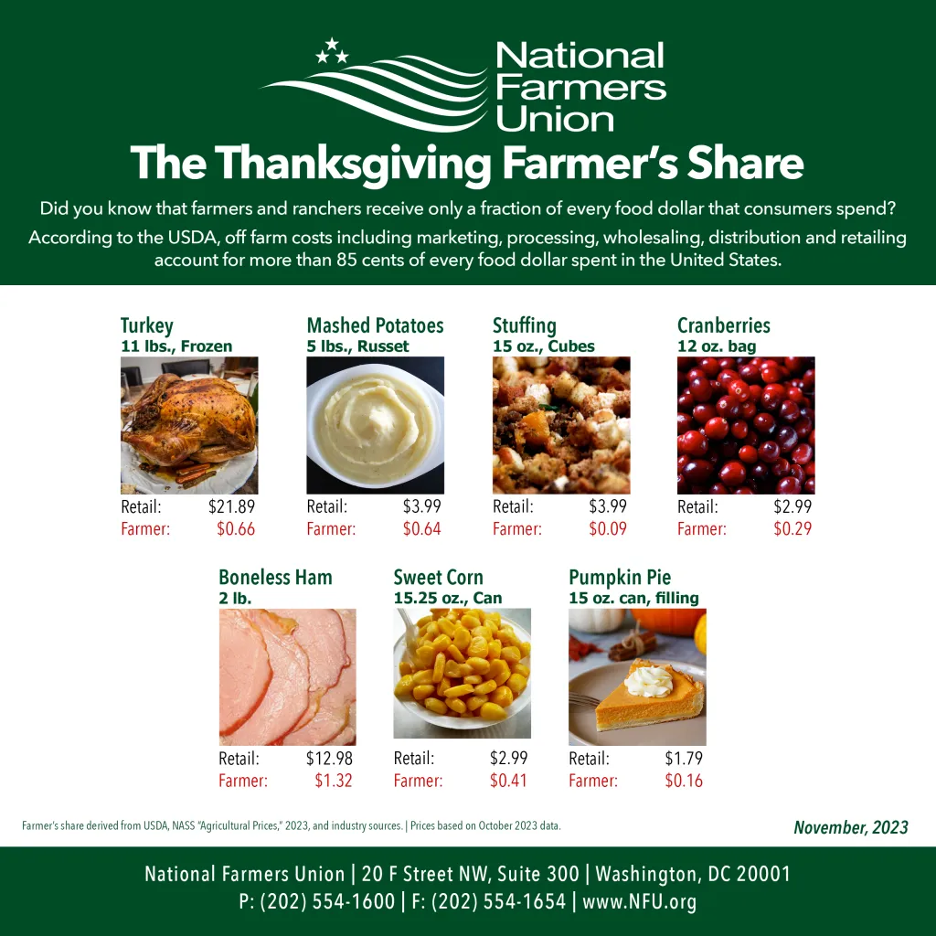
Throughout the holiday season, we continue to give thanks for the bounty produced by our local farmers and fishers. You can help to grow the movement for more resilient, sustainable & inclusive food system in the Northeast.
In November the National Farmers Union (NFU) released the updated Farmer’s Share of the food dollar for items typically served during the Thanksgiving holiday. These figures reflect how much family farmers earn compared to the amount consumers pay at the grocery store.
As consumers empty their carts onto the checkout lines at their local grocery stores and supermarkets this year, they’re likely to see increased costs for certain goods. To make matters worse, little of that increase is being passed on to America’s family farmers and ranchers. Multiple waves of mergers and acquisitions during the last several decades have resulted in agriculture and food supply chains that are uncompetitive and fragile, but also underpay farmers.
That’s why we hope you will join the New England Farmers Union!
Family Farmers and Fishers are the heart of the Farmers Union — and consumers are also invited to join as a “Friend of the Farmer” for just $15! Businesses or organizations can also join, and NFCA Member Co-ops can sign up at a special discounted rate of $100 — and when you do, we’ll send you one of these beautiful metal signs and complimentary one-year memberships to offer to your favorite local farmers!
Turkey and stuffing, the centerpieces of many Thanksgiving tables, had the lowest farmer’s share of the food dollar of the group with just $0.03 and $0.02 of each dollar spent at retail making it back to growers.
Included in the 2023 Thanksgiving Farmer’s Share numbers are:
- Turkey, 11 lb frozen: Retail Price – $21.89, Farmer’s Share – $0.66
- Mashed Potatoes, 5lb bag: Retail Price – $3.99, Farmer’s Share – $0.64
- Sweet Corn, 16oz frozen: Retail Price – $2.99, Farmer’s Share – $0.41
- Stuffing, 12oz box: Retail Price – $3.99, Farmer’s Share – $0.09
- Boneless Ham, 2lb: Retail Price – $12.98, Farmer’s Share – $1.32
- Pumpkin Pie Filling, 15oz can: Retail Price – $1.79, Farmer’s Share – $0.16
- Cranberries, 12oz: Retail Price – $2.99, Farmer’s Share – $0.29
NFU’s Fairness for Farmers campaign is working to solve the monopoly crisis in food and agriculture. Through stronger antitrust enforcement and greater transparency, we can increase the farmer’s share of the food dollar and bring fairness for farmers and consumers alike.
Data for this publication was sourced from USDA NASS, and other industry sources. More information on the Farmer’s Share here.
Your food co-op is committed to supporting local producers through your purchasing power, long-term partnerships, and collaboration. We can also work together by joining our voices in calling for a more just, inclusive and sustainable food system that works for everyone.

Join the Farmers Union! The National Farmers Union advocates on behalf of nearly 200,000 American farm families and their communities. We envision a world in which farm families and their communities are respected, valued, and enjoy economic prosperity and social justice. The Neighboring Food Co-op Association is an affiliate member of the New England Farmers Union chapter – and invites farmers, food co-ops, and consumers to join us! For more information, please visit www.newenglandfarmersunion.org.
Upcoming Events
Co-operative Identity Consultation Education, Training & Information

Online, Tuesday 5 Dec 2023, 9:00 AM EST
NCBA CLUSA and the International Cooperative Alliance (ICA) are joining forces once again to host a conversation on the Co-operative Identity — this time on Principle 6 and UN Sustainable Development Goal 16, “Peace, Justice and Strong Institutions.”

